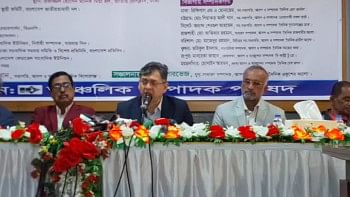Serajul Islam Choudhury: Our foremost intellectual and writer in Bangladesh

Today – June 23 – marks the 87th birthday of Serajul Islam Choudhury. He was my direct teacher in the English Department of Dhaka University, where I studied as an undergraduate. I also had the privilege of working with him closely in the 1990s when he exemplarily edited a left viewsweekly called Saptahik Samoy, one with which I, too, was editorially associated. I happily recall his remarkable editorial acumen and prowess. And, more importantly, I vividly recall his matchless classroom lectures on Jane Austen, Charles Dickens, Leo Tolstoy, Joseph Conrad, and DH Lawrence, among others. Those lectures – replete with instructive ideas and illuminating insights – were both powerful and beautiful, ones that effortlessly combined his vast erudition with his passionate commitment to social justice and change. He is by far one of the best teachers I have had in my life.
But, for us, Serajul Islam Choudhury is more than an outstanding classroom lecturer or an accomplished academic as such, although the poet-playwright Syed Shamsul Haque memorably characterised him as "our nation's teacher." Literary and cultural critic, historian, sociologist of the everyday, political analyst, essayist, columnist, editor, translator, activist, and even organiser, Serajul Islam Choudhury is our foremost writer in the Bengali language and, of course, our leading intellectual in the country – one who is also our major anticapitalist, anti-imperialist, anticolonial, and antipatriarchal writer – one who has been speaking truth to power for nearly six decades now, and one who can surely be placed in the global tradition of such combative intellectuals as Edward Said, Noam Chomsky, and Angela Davis, to name but a few.
Indeed, Choudhury – an internationalist as he is – has so far survived the unprecedented global pandemic that has swept our planet, while already writing about how this very pandemic exposes and even exploits all kinds of inequalities that also bespeak the naked brutalities and explosive contradictions of the existing system that Choudhury continues to name with clarity and conviction: Capitalism. Indeed, Choudhury is our leading socialist writer and intellectual as well.
The author of countless articles and more than a hundred books – one who has produced some remarkable works in English as well – Serajul Islam Choudhury dwells on an extraordinarily wide range of themes and topics, questions and concerns, to which I cannot do justice in an exceedingly short piece like this one. Indeed, his thematic preoccupations range across different historical periods in the Indian subcontinent and Bangladesh. One of his major and magisterial works called Jatiyotabad, Sampradayikata o Janoganer Mukti (2015) is by far the most interdisciplinarily engaged, wide-ranging historiographical work produced in Bangladesh.
True, Choudhury's concerns range from the British colonial and Pakistani neocolonial periods to our national liberation movement of 1971 to the mainstream political culture that has evolved in Bangladesh, from Marx to Mao, from Rokeya to Pritilata, from Fanon to Somen Chanda, from Vidyasagar to Bhashani, from Sophocles to Shakespeare, from Socrates to Said, or from Beowulf to Virginia Wolf, not to mention his concerns with Rabindranath Tagore, Kazi Nazrul Islam, and Jibanananda Das as well as his concerns with the ancient Greek epics and with what FR Leavis calls the "great tradition," to mention but a few.
But Serajul Islam Choudhury always remains characteristically critical of the canonical and the dominant and the Establishment – remaining committed to the production of demystifying and oppositional knowledge – from the perspectives of those who are oppressed, exploited, marginalised, or what the Latin American writer Eduardo Galeano memorably calls "nobodies." Indeed, in his works, Choudhury remains concerned – to varying degrees – with Bangladesh's workers, peasants, women, and minorities, while remaining consistently critical of our national ruling classes and Choudhury's own class – the middle class. Of course, class itself constitutes his fundamental political concern as well as his analytical horizon, one which, however, remains hospitable to a whole host of interconnected economic, social, and cultural issues that turn out to be the sites of class struggles themselves.
For Choudhury, then, criticism does not merely amount to critical or aesthetic evaluations of individual authors as such. He is the first one to have seen the limits of so-called "New Criticism" and aestheticist criticism in Bangladesh. For him, criticism is rather a larger intellectual and political practice that pays attention to actually existing unequal power relations and production relations that affect the practice of everyday life, while also calling attention to the question of human emancipation itself, something which further constitutes an abiding and overarching theme in Choudhury's almost entire oeuvre ranging, say, from his earlier work Nirasroy Grihee (1977), to Srenee Samay Shahittya (1986) and Swadhinata Spriha Sammyer Bhoy (1988), to Gonotontrer Pokkhe Bipokkhe (1990) and Rashtra o Kalpolok (1990), to Rashtrer Malikana (1997) and Uponibesher Sangskriti (1999), to Pitritantrikotar Bipokkhe (2007) and Pa Raakhi Kothay (2018), to Vidyasagar o Koyekti Prosongo (2021).
And, in almost every work cited above, Choudhury remains politically and intersectionally alive, as he himself tells us: "It's impossible to discuss culture and society without discussing politics as such" (translation mine). In fact, using the Gramscian contention that culture itself is political and that politics has its own culture, one might say that Choudhury deals with the politics of culture and the culture of politics in his various works. And one of the fundamental conceptual contributions Choudhury makes – via his early landmark intervention called Unish Shotoker Bangla Goddyer Samajik Byakaron – is his interdisciplinary notion of what he himself calls "the social grammar of literature," vectored as it is by the political and the political-economic in the final instance. Indeed, Choudhury is by far the most politically and socially engaged literary and cultural critic in Bangladesh, one for whom interdisciplinarity itself turns out to be a mode of emancipatory praxis. Of course, Choudhury's role here as a literary and cultural critic can by no means be dissociated from his role as a socialist intellectual.
Now a few words about Serajul Islam Choudhury's style. Indeed, among the numerous contributions he has made, one major contribution is his style itself. And, for him, style is not only an aesthetic but a political question insofar as it contributes to the power of language that can grip the masses. Chowdhury's prose powerful and beautiful in more senses than one; it attracts, moves, stimulates, even provokes, while, in the first place, it is immensely, even infinitely, and pleasantly readable.
Indeed, Serajul Islam Choudhury remains phenomenally productive and active even in his late eighties, as he tirelessly reads, writes, edits, publishes while also frequently delivering public lectures. It is not for nothing that – probably thinking of people like him – the great Latin American poet and socialist Pablo Neruda ardently announced in his poem "Ode to Age:" "I don't believe in age." On his 87th birthday, I wish my teacher a more productive life full of love and light and laughter; and, as my teacher knows well, "it's beautiful to love the world with eyes/ that have not yet/ been born," to use the great Guatemalan poet Otto Rene Castillo's words.
Dr Azfar Hussain is currently Summer Distinguished Professor of English & Humanities at the University of Liberal Arts Bangladesh (ULAB). He is director of the graduate programme in social innovation, and associate professor of integrative, religious, and intercultural studies at Grand Valley State University in Michigan, US. He is also the vice-president of the US-based Global Center for Advanced Studies (GCAS).


 For all latest news, follow The Daily Star's Google News channel.
For all latest news, follow The Daily Star's Google News channel. 



Comments